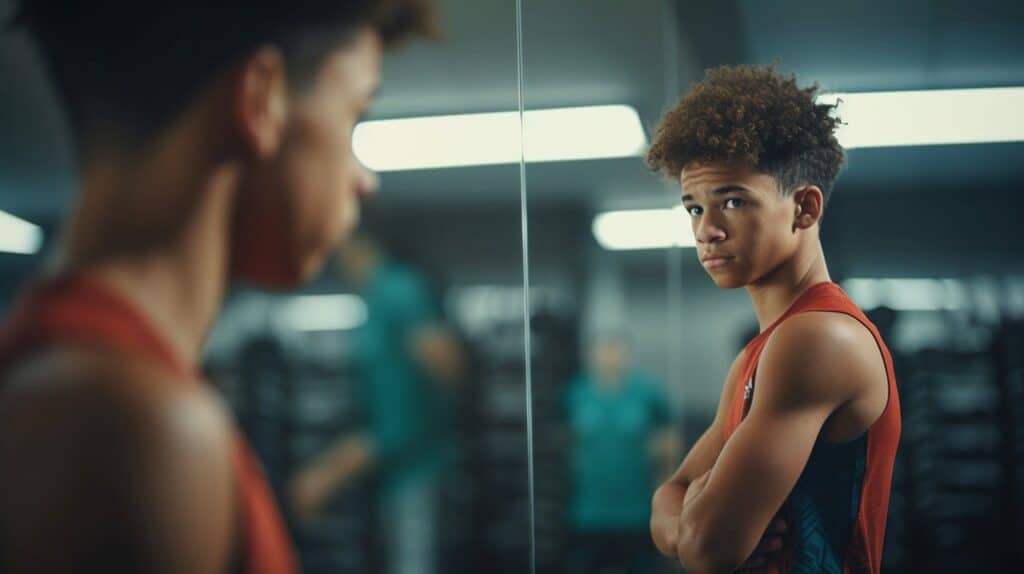As a sports coach, I understand the importance of mental toughness for young athletes. It’s not just about physical strength; it’s about developing specific mental skills and characteristics that can enhance their performance.
That’s why I’m excited to share with you some valuable insights on building self-confidence and mastering performance evaluation. These two key characteristics are essential for young athletes to thrive in their sport.
So, if you’re ready to take your game to the next level, let’s dive into the world of mental toughness together!
Key Takeaways
Mental toughness is a skill that can be developed in young athletes.
Building self-confidence is crucial for developing mental toughness.
Teaching young athletes to think and speak positively to themselves can increase self-confidence.
Proper performance evaluation and focusing on the positives first can enhance mental toughness.
Table of Contents
Building Mental Toughness: The Key Characteristics for Young Athletes

To build mental toughness, you need to focus on developing self-confidence and improving your ability to evaluate your performance.
Developing resilience is crucial in building inner strength and overcoming adversity. It requires a mindset that embraces challenges as opportunities for growth.
Building mental toughness in young athletes involves teaching them how to bounce back from setbacks, stay motivated in the face of obstacles, and maintain a positive attitude.
By building their self-confidence, they can believe in their abilities and push through difficult times. Additionally, improving their performance evaluation skills allows them to objectively assess their strengths and areas for improvement.
This mindset shift helps young athletes see failures as learning experiences and fuels their determination to keep working towards success.
Developing these key characteristics will help young athletes develop the mental toughness needed to excel in their chosen sport.
Cultivating Self-Confidence: Boosting Mental Strength in Youth

Building self-confidence in youth involves believing in their own abilities and developing a positive mindset. To boost their self-belief, encourage positive self-talk, and nurture their inner confidence, they can follow these steps:
- Believe in themselves: Recognize that they have the skills and talents needed to succeed.
- Challenge negative thoughts: Replace negative self-talk with positive affirmations.
- Set realistic goals: Break down big goals into smaller achievable steps to build confidence along the way.
- Celebrate successes: Acknowledge and celebrate even small accomplishments to reinforce belief in themselves.
Mastering Performance Evaluation: A Productive Perspective for Young Athletes

Developing a productive perspective in evaluating my performance is essential for growth and improvement as an athlete. Effective strategies for performance evaluation are crucial to building mental toughness.
As a young athlete, I often struggle with perfectionism, which can hinder my progress. Overcoming this mindset requires focusing on the positives rather than dwelling on mistakes or external approval. Positive self-talk plays a significant role in building mental toughness. By replacing negative thoughts with positive statements, I can increase my self-confidence and belief in my skills and abilities. This exercise of listing negative phrases and creating positive affirmations helps train me to speak positively to myself.
Objectively evaluating my performance allows me to identify areas for growth and improvement, ultimately leading to greater success as an athlete.
Mental Toughness Training: Steps to Develop Resilience in Youth

The exercises provided in the article are effective in cultivating specific mental skills and characteristics in youth. Developing a mindset of resilience is crucial for young athletes to overcome challenges and build mental toughness.
Here are four steps to develop resilience in youth:
- Embrace adversity: Encourage young athletes to see challenges as opportunities for growth rather than obstacles.
- Foster a growth mindset: Teach them that their abilities can be developed through hard work and dedication rather than being fixed traits.
- Build a support system: Surround them with positive role models, coaches, and teammates who can provide encouragement and guidance.
- Practice self-care: Teach them the importance of rest, relaxation, and maintaining a healthy balance between sports and other aspects of life.
The Young Athletes’ Mental Toughness Course: Enhancing Performance and Achieving Goals

To enhance your performance and achieve your goals, consider enrolling in the Young Athletes’ Mental Toughness Course. This course offers comprehensive training in mental skills and characteristics that are crucial for success in sports.
Through workbook exercises, you will learn goal setting techniques, sport psychology strategies, and more to improve your mental game.
The course covers six key fundamentals, including managing mistakes, improving focus, and goal setting. Each module provides practical exercises for you to complete in your workbook. These exercises will help you develop self-confidence, evaluate your performance effectively, and build mental toughness.
By enrolling in this course, you will have access to expert guidance and valuable resources that can take your athletic performance to the next level.
Don’t miss out on this opportunity to enhance your mental game and achieve your goals. Enroll in the Young Athletes’ Mental Toughness Course today!
Frequently Asked Questions
How Long Does It Typically Take to Develop Mental Toughness in Young Athletes?
Developing mental toughness in young athletes varies depending on individual factors and training techniques. It typically takes time to cultivate these skills, with consistent practice and guidance. The Young Athletes’ Mental Toughness Course offers a comprehensive approach to speed up the process.
What Are Some Common Obstacles That Young Athletes May Face When Building Mental Toughness?
Common obstacles in building mental toughness include perfectionism and seeking external approval. Strategies to overcome perfectionism include focusing on positive evaluation and managing mistakes. Mental toughness also benefits performance in other sports.
Are There Any Specific Strategies or Techniques That Can Help Young Athletes Overcome Perfectionism?
There are several strategies and techniques that can help young athletes overcome perfectionism. By focusing on progress rather than perfection, setting realistic goals, and practicing self-compassion, they can develop resilience and mental toughness.
Can Mental Toughness Training Be Beneficial for Young Athletes in Sports Other Than the Ones They Currently Participate In?
Yes, mental toughness training can be beneficial for young athletes in sports other than the ones they currently participate in. It helps develop resilience, focus, and confidence, which are essential in any competitive environment.
Are There Any Age Limitations for Young Athletes to Participate in the Young Athletes’ Mental Toughness Course?
There are no age limitations for young athletes to participate in the Young Athletes’ Mental Toughness Course. The course offers benefits for different age groups and has eligibility criteria that accommodate a wide range of athletes.
Conclusion
In conclusion, building mental toughness in young athletes is like forging a steel sword. By cultivating self-confidence and mastering performance evaluation, we sharpen their minds and strengthen their spirits.
With the Young Athletes’ Mental Toughness Course as our guide, we provide them with the tools to conquer any challenge that comes their way. Let us sculpt these young champions into resilient warriors who fearlessly chase their dreams and soar to new heights of achievement.
The path to greatness starts here, where mind meets muscle and determination fuels success.


